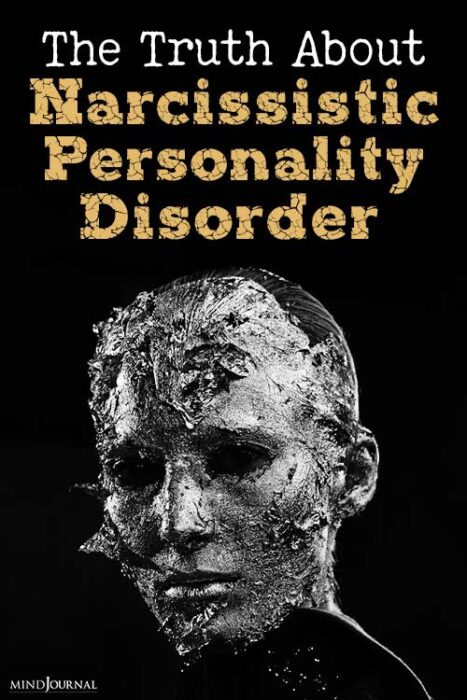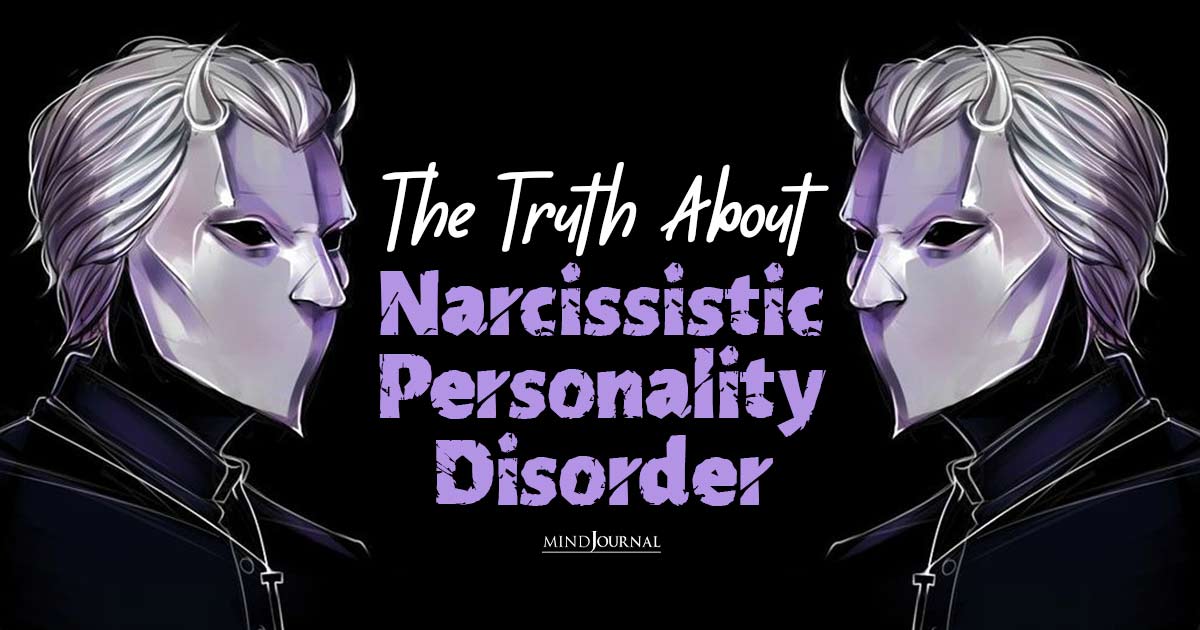Understanding the truth about narcissistic personality disorder can help you understand what it really is, instead of believing incorrect facts and descriptions. So, what is NPD or what is narcissism really?
The Truth About Narcissistic Personality Disorder
What therapists know about narcissism that you need to know.
By Dr. Elinor Greenberg
Every once in a while, a new diagnostic label emerges in mass consciousness and people start to use it (and misuse it) as a synonym for bad behavior.
This year’s label seems to be “Narcissist.” I thought that it might be useful to clarify what mental health professionals mean when they talk about narcissism.
What is Narcissistic Personality Disorder?
Narcissistic Personality Disorder (NPD) is the name for a series of coping strategies that began as an adaptation to a childhood family situation that left the person with unstable self-esteem, the inability to regulate their self-esteem without external validation, and low empathy.
As with all three of the major categories of personality disorders—Borderline, Narcissistic, and Schizoid—people with NPD also lack “whole object relations” and “object constancy.”
Related: The Empath And The Wounded Narcissist
Narcissistic Personality Disorder – Whole Object Relations
This is the capacity to see oneself and others in a stable and integrated way that acknowledges both the person’s good and bad qualities.
Narcissistic Personality Disorder – Object Constancy
This is the ability to maintain a positive emotional connection to someone that you like while you are angry, hurt, frustrated, or disappointed by his or her behavior.
Without “whole object relations” and “object constancy” people with NPD can only see themselves and other people in one of two ways: either they are special, unique, omnipotent, perfect, and entitled (High Status); or they are defective, worthless, garbage (Low Status).
This means that the person struggling with Narcissistic issues cannot hold onto his or her good opinion and good feelings about someone, once he or she notices the other person has a flaw. The other person goes from being special and put on a pedestal to being devalued as “nothing special.”
Narcissists often seesaw back and forth between these two. When they are feeling good about you (or more accurately, you are making them feel good about themselves), they see you as special.
Then you do something that they do not like, such as say “no” to one of their requests, and suddenly you are now all-bad and worthless.
Later on, you may do something that makes them feel good again, and they are back again to seeing you as special.
Types of Narcissistic Personality Disorder
Normal vs Pathological Narcissism
Unfortunately, in the English language, the word “narcissism” has come to mean two entirely different things, depending on whether it is being used formally as a diagnosis, as in NPD, or informally as a synonym for positive self-regard.
I am often asked, “Isn’t a little bit of narcissism healthy and normal?” I would like to clarify that distinction before I go on.
Related: The 5 Child Roles In Dysfunctional Families
Normal, Healthy Narcissism
This is a realistic sense of positive self-regard that is based on the person’s actual accomplishments. It is relatively stable because the person has assimilated into their self-image the successes that came as a result of their actual hard work to overcome real-life obstacles.
Because it is based on real achievements, normal, healthy narcissism is relatively impervious to the minor slights and setbacks that we all experience as we go through life.
Normal narcissism causes us to care about ourselves, and do things that are in our real self-interest, and is associated with genuine self-respect. One can think of it as something that is inside us.
Pathological, Defensive Narcissism
This is a defense against feelings of inferiority. The person dons a mask of arrogant superiority in an attempt to convince the world that he or she is special.
Inside, the person feels very insecure about his or her actual self-worth. This façade of superiority is so thin, that it is like a helium balloon—one small pinprick will deflate it. This makes the person hypersensitive to minor slights that someone with healthy narcissism would not even notice.
Instead, someone with this type of defensive narcissism is easily wounded, frequently takes any form of disagreement as a serious criticism, and is likely to lash out and devalue anyone who they think is disagreeing with them.
They are constantly on guard trying to protect their status. Pathological Narcissism can be thought of as protective armor that is on the outside of us.
When I talk about “Narcissism” in this article, I am talking about the pathological, defensive Narcissistic strategies that people with Narcissistic Personality Disorder developed to deal with life that began as an adaptation to their childhood experience, not “healthy” internal self-regard.
Why is Defensive Narcissism unhealthy?
Having NPD is like going through life always on the defensive. If you are Narcissistic, your self-esteem is always on the line. You tend to feel insulted and criticized when no insult or criticism is intended. In addition, you lack emotional empathy.
You do not feel any pain when you hurt other people, or if you do, it is much less than the average person feels.
As a result, your sensitivity is all one-way: you may attack someone else for the slightest misstep or even for using the wrong word, while you know in your heart that this person could be dying in front of you and all you would feel is annoyed at the inconvenience.
Related: Things Narcissists Don’t Want You to Know
All of this makes it hard for Narcissists to sustain serious intimate relationships after the early stages of a relationship because:
- They are continually trying to prove that they are superior.
- They tend to misperceive and overreact to other people’s behavior.
- They are extremely self-centered.
- They lack empathy for other people’s feelings.
- They are willing to devalue and humiliate other people.
Red Flags for Narcissistic Personality Disorder
Although the diagnosis is best left to mental health professionals, there are some common signs of defensive, pathological Narcissism that the average person can learn to recognize.
I think of these as “Red Flags for Narcissistic Personality Disorder.”
1. Status Consciousness
Narcissists make statements that show that they are extremely aware of status markers and frequently call attention to their own or other people’s status.
They may make comments, such as: “Do you know how rich he is?” “Every important person in the city will be at that charity party. I have to be there or everyone will think I did not rate an invite.”
2. Hierarchical Thinking
They place every person, every place, and every object that catches their attention on a hierarchy from lowest to highest according to some status marker that they value.
With regard to people, they tend to be deferential and super nice to those people that they consider above them. Those they consider below them, they look down on, mistreat, ignore, or graciously condescend to treat well depending on their mood.
They tend to get into dominance fights with people who are on approximately their own level and have trouble with the idea that anyone may be their equal. Their hierarchical thinking and their emphasis on status lead them to continually make comparisons about everything.
In these comparisons, one thing will be marked off as better (higher in the hierarchy) than the other. They are likely to pepper their conversation with references to where people are with regard to their place on some hierarchy, such as: “I belong to a much more exclusive club than he does.” “I scored higher on my SATs than she did.”
To a Narcissist, nothing has inherent value aside from its status. Therefore, the value of anything and everybody can and will change when its current status in the Narcissist’s reference group changes.
3. One-Mindedness
True Narcissists can only see things from their own perspective. This is similar to how very small children view the world. They cannot understand how two people might have different, yet equally valid points of view.
If they offer their view and you offer a different one, they assume that you are telling them that they are wrong. They are likely to react as if you are attacking them, rather than simply giving your opinion.
They will project the source of the problem onto you. You are likely to hear statements like, “Why do you always have to disagree with everything that I say?”
4. Hypersensitivity to Slights
They are hypersensitive to feeling slighted or mistreated in any way. They assume that if they feel hurt, the other person is doing it on purpose.
In their mind, they are always the innocent victim and the other person is the hostile perpetrator. Their refrain is: “How could you do that to me?” (Fill in the blank with anything from the restaurant hostess giving them a less preferred table to you saying something in public that they decided showed them in a less than perfect light).
5. Disproportionate Anger
People with narcissistic personality disorder get extremely mad at things that seem quite minor to most people, like waiting an extra ten minutes for a table in a restaurant.
Their degree of fury and hurt will seem very disproportionate to the actual situation. For example, your new boyfriend wants you to wear a particular sexy dress for the party where you will meet his friends.
You forgot to get the dress from the cleaners and plan to wear something else instead. He gets furious with you and starts screaming and threatening you, “I am not taking you to meet my friends if you wear that!”
6. Grandiosity and Devaluation
I call this the “GOD” defence. When something makes them feel inferior or imperfect, they become Grandiose, they insist on their Omnipotence, and they Devalue other people.
They may make statements that sound as if they must be kidding or simply exaggerating, like: “I could easily do my boss’s job better than he does. In fact, I could do his boss’s job! I know exactly what needs to be done. They are all a bunch of idiots!”
Unfortunately, Narcissists are not joking or simply exaggerating when they say things like this. They are becoming grandiose and devaluing in order to support their shaky self-esteem.
Related: 7 Signs Your Partner Is Feeding Your Self-Doubt on Purpose
7. Extreme Language
Everything and everybody is either perfect, special, or the best, or else they are the absolute worst. There is nothing in between. Anyone that they are mad at automatically becomes “the worst possible human being in the world.”
Cheryl described her last boyfriend to her new boyfriend this way: “He changed. I thought he was a good and decent person when I met him, but I was wrong. He was a disgusting, abusive, violent person. I should have had him arrested.”
That would be quite believable if it were not for the fact that Cheryl described her last three boyfriends in exactly the same way. Either Cheryl is the worst judge of character in the world, or she lacks “whole object relations” and switches from seeing the person as all-good to all-bad once she sees any flaws.
8. Low Empathy
They say and do things that hurt other people without seeming to care about causing pain. Sometimes they are oblivious to other people’s reactions because they are so focused on themselves.
If you point out that they said something that hurt you, they are likely to either make light of it, “I didn’t mean it that way. You are too sensitive,” or turn around and outright attack you, “Only a moron like you would think that was an insult.”
9. Cruel Descriptions of People
Many Narcissistic people use language that other people find cruel and inappropriate. They say things out loud that other people might think, but keep to themselves for fear of hurting someone.
“I can’t believe someone as fat as she is wearing that dress and she thinks it makes her look good.” Or, “That is the stupidest waiter I have ever had.”
10. Narcissistic people fail to Apologize or Admit Mistakes
Narcissists construct a defensive façade in order to protect their shaky self-esteem. They do not actually have stable enough self-esteem to admit mistakes and apologize without feeling more shame than they can tolerate.
They also believe on a deep, sometimes unconscious, level, that if they admit that they are not as perfect as they pretend to be, the other person is going to take the admission as an opportunity to degrade and humiliate them.
Related: 15 Things Narcissists Don’t Do
Punchline
While all Narcissists are unique individuals, they usually have a number of things in common because they all share similar problems: how to stabilize their shaky self-esteem, how to get the admiration and validation that they crave, and how to deal with their extreme sensitivity to minor slights and criticisms.
Most of them use very similar coping strategies.
If you keep the above list in mind and the difference between normal and pathological Narcissism, you can become quite adept at recognizing the more commonly encountered Narcissistic patterns.
By Elinor Greenberg, Ph.D., CGP
This post originally appeared on Psychology Today and has been republished here with the author's permission











